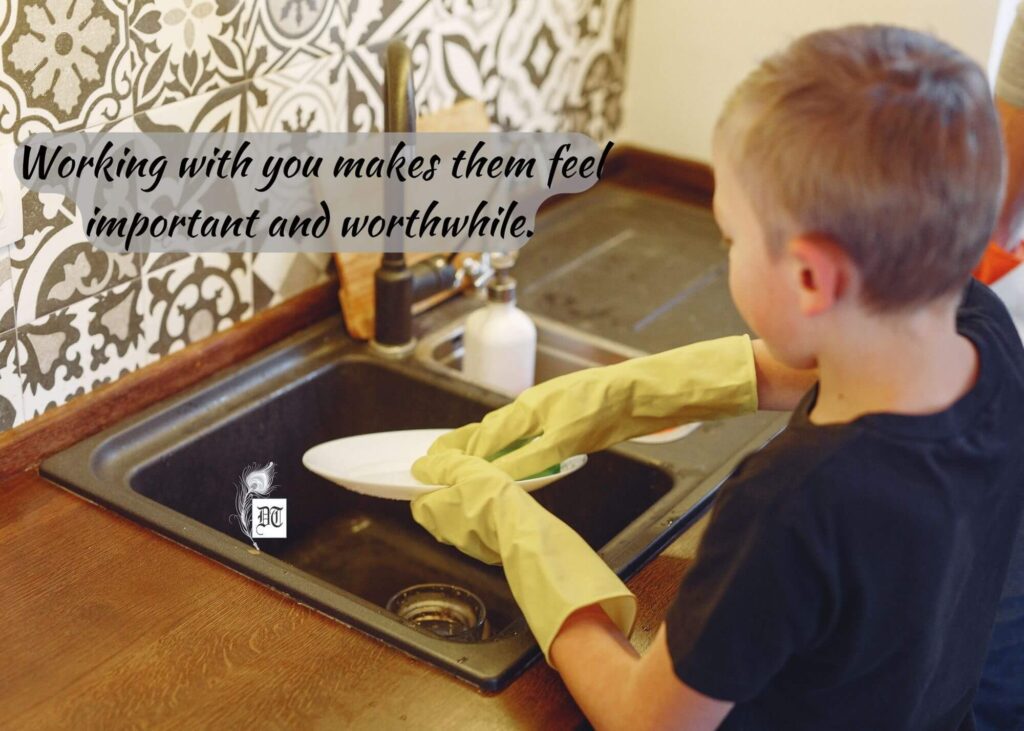There is a common feeling of guilt of the parents to involve their children to help out needs to be stopped, as children are part of the family. There is a chart of age appropriate chores at the bottom of the article, says Anumita, in this write-up on the need of involving children in household chores, exclusively for Different Truths.
“It is not what you do for your children, but what you have taught them to do themselves that will make them successful human beings.” ~ Ann Landers
Children are not born with their mind programmed to fall into a routine. We, parents, as caregivers are responsible to make that happen. Teaching them duty and responsibility is one of the major lessons. But how can this be taught without superimposing it on them? That is the question. It has to be a gradual process and incorporated into our day to day life. Daily chores are one of the biggest issue parents and children often land with a tug-n- war situation.
“Clean your bed,” “Do the laundry,” “Vacuum your room,” “Set the table,” are some of the common things most parents are verbalising and children often ignore. A situation of power-play and frustration sets in. This need not be the situation, as there are subtle and fruitful ways in which chores can be part of a daily routine of the children and the family can function without all the added drama.
Before we go on to the ways and procedures, let us put ourselves in our children’s shoes.
Before we go on to the ways and procedures, let us put ourselves in our children’s shoes. We were kids too, and we often frowned when commands of some chores were given to us. Yes, most of us got into a habit later on, but then the first few times were never fun. Similarly, our children often think these chores as things with no instant gratification, as they are more impulsive and self-absorbed. They cannot process the long term benefit they would derive from doing chores at home. That takes maturity, which only you, as a parent and caregiver posses. Many children don’t understand the amount of work it is required to run a family and a house. They may not even understand the abstract idea of duty and responsibility. It is not comprehensible to them, at an early age.
Understanding the children’s point of view, it would be easier for most parents to formulate strategies to get their children involved in the household work. It does not matter how young your kids are, they are always ready to help. Children, often the younger ones, want to be a part and please their families.
Rope them in doing few easy things, like wiping the furniture or the window sills. Working with you makes them feel important and worthwhile.
There is a common feeling of guilt of the parents to involve their children to help out needs to be stopped, as children are part of the family. Children love to feel needed and appreciated. Making them a part of the daily routine creates a feeling of accomplishment. Young children often imitate their parents, while the parents are doing their chores. Rope them in doing few easy things, like wiping the furniture or the window sills. Working with you makes them feel important and worthwhile. This boosts their emotional and social skills too. There is a chart of age appropriate chores at the bottom of the article, which I downloaded from a prominent parenting magazine.

According to Elizabeth Pantley, a parent educator and an established author on this subject, “Keep in mind that a child who has mastered a complicated computer game can easily run the dishwasher.” This proves that the earlier a child gets involved in chores, the better he or she grows to be responsible. We would want our children to go into the adult world well prepared to take care of themselves and feel confident to succeed in their field of study, research or career.
A survey conducted by Braun Research Study, in 2014, for 1001 US adults. From among the respondents, 82% of them answered “yes” for having chores when they grew up, but only 28% of them are using it on their children. Why do we see such fall in data? The answer seems to be in the added pressures of society. Parents and children both have a full plate and often the time to set chores is missing, and there has to be an appointed person to set up chores.
A deadline of sorts would be beneficial, as most of us individuals (young or older) need a time frame to work on.
One of the solutions for such a situation would be to sit down and get a list of chores. If the children are big enough to discuss with them and let them choose their chores and if not it would be the parent’s discretion to decide it for them. A chart or wipe off board could be mounted in a family zone, with the chores are written down with the family member’s name. A deadline of sorts would be beneficial, as most of us individuals (young or older) need a time frame to work on.
A big matter of debate amongst most parents is on the point of paying allowance for chores. As a parent my first instinct is to say “no”. It has been proved that paying for chores they are to do as being a part of the family does not really help in them to get the feeling of responsibility. Do use praises and be generous with them. Most of the time the children are not able to do the chores just the way you do or you like it. It is Okay. They are learning. Show how it is done. Do it with them till you find the day they can go solo. Coming back to the issue of allowance, make that a special event. The monetary allowance as you give to your children on week or month basis should not be linked with their daily chores. You can pay them on the basis of special work they perform. Say if they do mow the lawn and clean up the garden on their own, or shampoo the carpets or even wash the car, then that warrants remuneration. That is entirely on you and your child how you work out the remuneration.
Never make chores a punishment.
Parents, a heads up on one thing. Never make chores a punishment. That is the most negative message we will be communicating towards our children. Children pick up on our vibes more that we can understand. So try your best not to show your children how burdened you are. It is advisable to discuss your situations, with children, who are little older and explain them the need for help.
Every family is different, and that includes the social, cultural and economical structure. There are no fixed rules, which one can apply to all families. We, as parents have to do our best to see which rule and facts apply to our family dynamics.
List of Appropriate Chores1 : Webmd.com/ Parenting
Chores for children ages 2 to 3
- Put toys away
- Fill pet’s food dish
- Put clothes in hamper
- Wipe up spills
- Dust
- Pile books and magazines
Chores for children ages 4 to 5
Any of the above chores, plus:
- Make their bed
- Empty wastebaskets
- Bring in mail or newspaper
- Clear table
- Pull weeds, if you have a garden
- Use hand-held vacuum to pick up crumbs
- Water flowers
- Unload utensils from dishwasher
- Wash plastic dishes at sink
- Fix bowl of cereal
Chores for children ages 6 to 7
Any of the above chores, plus:
- Sort laundry
- Sweep floors
- Set and clear table
- Help make and pack lunch
- Weed and rake leaves
- Keep bedroom tidy
Chores for children ages 8 to 9
Any of the above chores, plus:
- Load dishwasher
- Put away groceries
- Vacuum
- Help make dinner
- Make own snacks
- Wash table after meals
- Put away own laundry
- Sew buttons
- Make own breakfast
- Peel vegetables
- Cook simple foods, such as toast
- Mop floor
- Take pet for a walk
Chores for children ages 10 and older
Any of the above chores, plus:
- Unload dishwasher
- Fold laundry
- Clean bathroom
- Wash windows
- Wash car
- Cook simple meal with supervision
- Iron clothes
- Do laundry
- Baby-sit younger siblings (with adult in the home)
- Clean kitchen
- Change their bed sheets
Photos from the internet.
#Parenting #MotherWrites #ChoresAndChildren #Responsibility #ListOfChildrenChores #Children #HelpingInTheHouse #ChildrenHelping #DifferentTruths





 By
By
 By
By
 By
By
 By
By